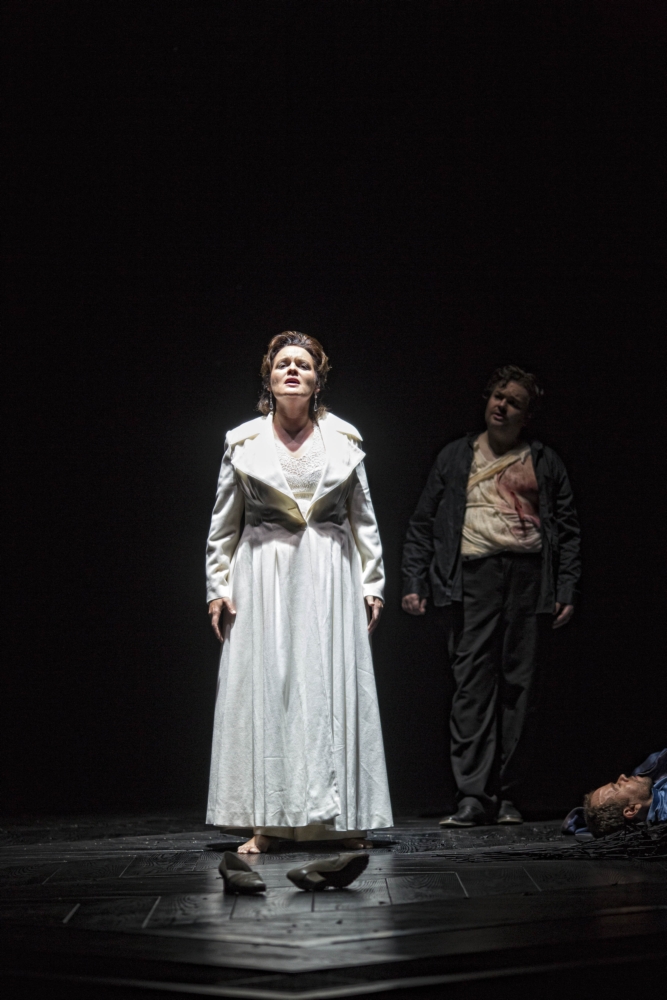A Brünhilde who does not burst into flames but endures the Götterdämmerung with a baby in her arms, a Senta who does not jump off a cliff but is shot by Erik together with the Holländer. No one really looks surprised anymore. And Isoldes who do not die in the Liebestod are no exception, but Tristan who rises from the dead, as it were, by Isolde's notes reaching into heaven, stands diagonally behind her and sings along soundlessly?
It happens in the at times literally breathtaking staging by director Jacobs Peters-Messers and set and lighting designer Guido Petzold. Yes, Wagner's Tristan und Isolde hits you again and again, each time at a different moment, but hardly ever in the infamous final scene. Not least because by then the soprano who has to sing Isolde's leaden part is already demolished after all the vocal violence of the previous three hours.
But after all the bloodshed in the final scene - for the frightening effect, King Märke has a gun - the Swiss Claudia Iten suddenly stands there, in bright white light, almost angelic, and serenely introduces 'Mild und leise'. In the six minutes that follow, the impossible happens: in the closing aria, she seemingly effortlessly expresses all the emotions of the entire opera once more, but even more poignantly. The Noord Nederlands Orkest pulls out all the stops, but it does not bother Iten; she transcends the orchestra, the music and the drama. This is no ordinary Liebestod, this is no ordinary Tristen und Isolde, something special is happening here.
That it is extraordinary that it has come to this major production at all should be well enough known, but artistic and business director Nicolas Mansfield gives it a twist in the programme book that ironically will also be music to Halbe Zijlstra's ears: "In a way, the changed budgets have also freed us from the oppressive obligation to exhaust ourselves in glorified stand-building and showcasing an excess of textiles and an overpowering mise-en-scène."
We certainly don't get to see an excess of textiles. Sven Bindsel's costumes are sober but effective and we don't even get to see the male chorus, which has a role only in the first act, at all: "Every man who doesn't have a costume makes money." But behind all the savings, there is indeed an artistic vision. "The music of Tristan und Isolde is so deep, I didn't want a staging that adds very many layers to it," Mansfield told newspaper Trouw. "That's why I offered Guido Petzold the chance to do the lighting and set design."
His abstract unit decor consists of two square planes that open and close, to represent the ship as easily as the castle garden. The associations are also obvious: a diamond, a chessboard, an oyster. Petzold makes no effort to disguise the theatrical technology either, quite the contrary: the side lights are pontifically in view. You can see how each lighting effect is created, and in the third act even the construction of the squares becomes visible as they lie on top of each other to form Tristan's castle.
A considerable part of the action takes place before the opera begins and is only unfolded in monologues and dialogues as the opera progresses. The theatrical adage 'show don't tell' was wasted on Wagner, but as is often the case with Wagner, this is pretence: the real action, the real drama takes place in the characters, and it is precisely this that comes into its own in these minimal sets.
Thanks partly to the emphasis on lighting, the whole thing is involuntarily reminiscent of the stripped-to-the-bone staging with which Wieland Wagner put Bayreuth back on the map after World War II. He wanted to break with the fraught past by focusing on the characters' motivations. Jacobs Peters-Messers also does exactly that in his detailed directing of persons, in which the smallest hand gesture is given meaning and in which nothing distracts from the music.
It is there, in the orchestra pit, that the story is really told. From the very first bars, Antony Hermus manages to extract a beautiful sound from the Noord Nederland Orkest, with beautiful long lines, clear accents and admirable dynamics. Each of the excellent soloists benefits from this; nowhere do they have to shout themselves out, nowhere do they face an unusual choice of tempo. That the Austrian tenor was inferior to Claudia Iten in the love duet is no disgrace. Against her Isolde, no one could stand up to her at the premiere.
National Travel Opera: Richard Wagner - Tristan und Isolde. With: North Netherlands Orchestra and National Opera and Concert Choir conducted by Antony Hermus. Wilminktheatre Enschede, 22 September. 3 more performances there, then on tour until 31 October.

